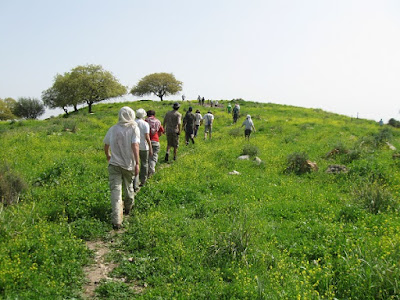 |
LOTEM volunteer Rachel Waldman, the author of this post (right) with a LOTEM participant.
|
By Rachel Waldman
Having spent many summers in Israel, I have profound memories of the people, the culture, and the land. Who can't help but fall in love with the waterfalls of Ein Gedi, the white sand by the Dead Sea. The rolling hills and lush green fields in the north. The land of Israel is as much a part of daily life there as the people, the culture, and the history.
 |
Hiking in beautiful Israel -- the quintessential experience.
|
That is why LOTEM-Making Nature Accessible plays such an integral role in creating an inclusive environment for all members of Israeli society. LOTEM makes nature accessible to everyone, including those who otherwise wouldn't be able to engage with the land that so many of us love.
According to a 2014 study by the Myers-JDC Brookdale Institute, about 20 percent of Israelis have some kind of special need. That means that one-fifth of the population does not have the ability to fully connect with nature and the land in the way so many others do. Their families, as well, are limited in where they can go and what they can do. Do you bring the rest of your family on a hike if you have one child in a wheelchair? One child who is blind? One child who will struggle with a walker? Before LOTEM was created, this 20 percent of the population and their families were missing out on one of the most significant parts of Israel: the land.
When I came to Israel this summer, I knew I wanted to volunteer and see firsthand how organizations in Israel deal with inclusion. After seeing a video about LOTEM, I knew it was an organization I wanted to learn more about. A few years ago, when I worked with children with developmental disabilities in New York, my interest was sparked. Everywhere I looked after that, I couldn't help but notice how different institutions and organizations create spaces (or fail to create spaces) for people with disabilities. The response of Jewish organizations has left me both amazed and frustrated. I am amazed by the programs that reach out and create space to those who are differently abled, but frustrated that most synagogues lack ramps and interpreters. We have made tremendous progress, yet we are still far behind where we ought to be.
Related:
Visiting an Israeli facility for the disabled changed my family forever
An inclusive society is a better society: How Israel weaves the disabled into its fabric
LOTEM is an organization that reminds me of where we ought to be. Through funding from the JNF, it created the only fully accessible hiking trail of its kind in the beautiful north. The trail, similar to other hiking trails with its beautiful pathways, calming waterfalls, and plentiful trees and plants, stands out with its leveled pathway, paved roads to allow for wheelchair use, and raised sides to allow those who are blind to feel around the edges with their walking stick.
LOTEM provides young adults serving in the army and sherut leumi (national service) who serve as the vibrant, knowledgeable, kind, and thoughtful guides. They make games, write songs, and create activities to engage the groups. They help them connect to nature and the land in a way that is meaningful for them, and their creativity is boundless.
Leah, the program coordinator at St. Vincent, a home for children with developmental disabilities, mentioned to me that to see children in nature for the first time, to watch them touch, feel, smell, engage, is truly something amazing. "The kids don't have opportunities to get out to nature, and we would never be able to afford the expenses it entails without LOTEM. In nature, textures, smells, sights, and sounds are so meaningful to the children. A park is much more meaningful to these kids than anything else- they can touch, feel, smell, and LOTEM always sends people that know our kid's needs, because the kids communicate differently."
I was lucky enough to observe this firsthand. I saw all types of people enjoying nature and
 |
The one-of-a-kind olive press at Lotem, fully accessible.
|
In addition to creating the fully accessible trail and ensuring that everyone has the chance to explore nature on a hike, LOTEM brings nature clubs to special-needs schools and group homes on a weekly basis.
"The nature club is the highlight of my students' week," Leah told me. "The lesson is stimulating and fun for everyone, and some of the kids who initially weren't supposed to be a part of the group forced their way in. They learn about nature, animals, recycling, and so many other things that are applicable and interesting to them. Their eyes light up as these concepts that were once out of reach now become alive." The nature clubs run throughout the country in all kinds of settings.
I, too, am filled with gratitude and hope. On the bus ride back from one of LOTEM’s outings, I was so moved by what I had seen that I could not help but cry -- both because of what LOTEM provides and because of how far behind much of society is lagging.

No comments:
Post a Comment